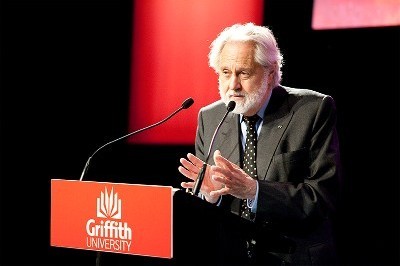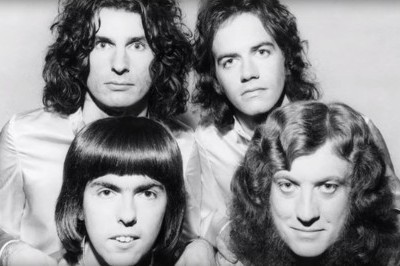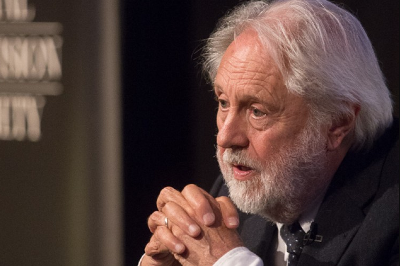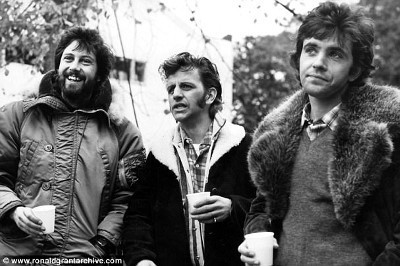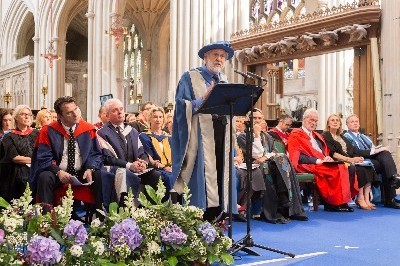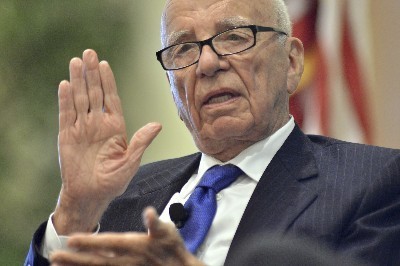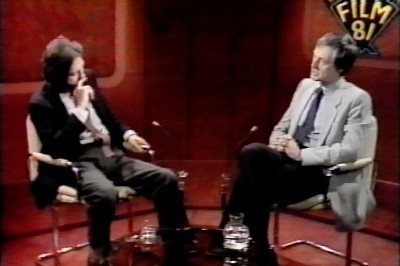Original Article: Daily Mail – written by Ray Connolly
One day in the early Seventies, I had a huge stroke of beginner’s luck. Going over to a friend’s house to borrow a book I was asked, over a cup of tea, if I would like to write a film. Just like that. Things like that weren’t unusual in those days.
The friend was David Puttnam who, after a successful career in advertising then as a photographers’ agent, had just become a film producer.
He had an idea that he thought might suit me.

I knew a bit about movies, absolutely nothing about writing a screenplay, but I agreed to have a go at it. So we talked and, by the time I went home that afternoon, not only had we sketched out a vague plot, we also had a title for our film.
It would be called That’ll Be The Day, the inspiration for it came to David when he’d heard the Harry Nilsson song, 1941, which opens with the lyric: ‘Well, in 1941 a happy father had a son, And by 1944 the father walked right out the door…’
I knew Harry Nilsson and I also knew that the song went on to tell how, when the son grows up, he runs away to join a circus.
David, however, had another career suggestion for the boy. ‘What if in our story he joins a fair?’ That was it. We were off.
Like Nilsson we were both in our early 30s and the film would be set in the late Fifties — our teenage years of rainy beaches, coffee bars and fairgrounds. Did I think it would ever get made? At that time, having no idea of the eye-of-a-needle chances of any film script reaching the screen, I probably did.
If David, who was in partnership with Sandy Lieberson, the producer of the Mick Jagger film Performance, had any serious doubts he kept them from me with his enthusiasm.
What I didn’t anticipate was that when That’ll Be The Day came out it would be a huge hit, that it would make a star of a young stage actor of whom, when I’d begun writing, I’d never heard.
Nor could I have imagined that it would co-star a Beatle and would lead to a No.1 album and a best-selling novelisation for me.
At the time my day job was interviewing rock stars and anyone culturally cool for the London Evening Standard, so I would work on the screenplay late into the night. Then, a couple of times a week, David would come to my house for his breakfast to see what I’d come up with, scattering new ideas as he entered.
Week by week we would then ransack our own lives as we created the fictional character of Jim Maclaine. After about three months I had a first draft of the script. Unfortunately, however, the Jim Maclaine character hardly did a decent thing in the entire story. He was the ultimate selfish teenager.
We needed something to make him likeable.
At which point David Puttnam took his family to see a stage production of Godspell in the West End. He phoned first thing the next morning.
He’d found our boy. David Essex, the lead in Godspell, was so good looking and likeable an audience would forgive him anything.
The next problem was that I’d written about working in a holiday camp but I’d never even been to one, let alone worked in one.
Fortunately we knew two people who had — Ringo Starr, who’d been a drummer at a Butlin’s camp, and The Beatles’ former road manager, Neil Aspinall, who was now the managing director of their Apple records operation.
So we went to see Ringo and Neil who were so entertaining with their Butlin’s memories that we offered Ringo the second lead in the film, as a friendly Liverpudlian Jack-the-lad.
For his part, Neil agreed to help put together the band to play in our fictitious holiday camp — with Keith Moon on drums and Billy Fury doing the singing.
We had a director by now in Claude Whatham and, as I rewrote and rewrote the script as is usual in film-making, everything was coming together very nicely.
There was just one more problem — the perennial one in films. All the money wasn’t yet in place.
Budgeted at a little over £200,000, it was hardly going to be an expensive movie to make, but in 1972 the British film industry was deep in the doldrums.
Then a miracle occurred. Puttnam went to see a small Canadian television marketing company and proposed building our movie around a plethora of old hits they could promote as a tele-marketed compilation album.
They would pump more than £200,000 into an advertising campaign, showing clips from the film, so all we had to do was put together a 40-track soundtrack album of oldies but goldies.
We’d always planned to have some songs in the film, but 40!
Quickly, I began another draft of the script. If we continually moved our leading character around the fairground, from the dodgems to the whip, past the big wheel and round again to the carousel, we could add a few seconds of a different record onto the soundtrack everywhere he went.
Then, when he seduced a girl, we would cynically hear the Everly Brothers singing Devoted To You in the background. When he was roller-skating it was to Bobby Darin’s Dream Lover.
By the end of the final draft, we’d found a place for all 40 songs.
Filming was mainly on the Isle of Wight (because in the early Seventies the island still had a late Fifties look to it) and, despite some of Keith Moon’s excesses — he arrived by helicopter, while we all went on the ferry — it was a happy shoot. Ringo, who turned up for filming in his own Teddy Boy outfit, was a revelation. We’d no idea he could act so well.
The best night I can remember was when we took over a fairground in Southsea for filming and the entire cast and crew had free use of the dodgems with the music blaring.
A teenage fantasy come true.
The reviews when the film was released turned out to be another fantasy come true, with just about all the major critics, apart from the great Barry Norman, liking it.In truth, Barry had seen through some of the flaws in the film!
At the time, I was astonished by its success. A sixth-form drop-out, who throws his school books into a river when he should be sitting his A-level history, writes poetry in the rain while hiring out deck chairs and lets down just about absolutely everyone, was hardly an obvious subject.
But, on reflection, I can now see there was nothing else like it at the time. And the music soundtrack was fantastic.
We hadn’t planned to make two films, but Puttnam saw a sequel as an opportunity to tell a story about the Sixties rock scene, something I’d been writing about as a journalist for the past six years.
And, coincidentally, at that very moment, David Essex was turning himself into a rock star.
He hadn’t sung in That’ll Be The Day, but to coincide with that film’s release, he’d co-written and recorded a song called Rock On, which by the summer of 1973 was high in the charts.
That August I joined Puttnam and his family on holiday in Italy while we sketched out the continuing story of Jim Maclaine.
This time we’d have a much bigger budget and wouldn’t only shoot in Britain, but also in Spain and America.
As it was a film about a rock band the first task, after the script had been written, was getting the new music recorded. We chose the Welsh musician Dave Edmunds to do that, virtually as a one-man band. It was extraordinary watching him play all the instruments.
We obviously wanted Ringo back, following his great success in That’ll Be The Day, but when he read the script for the new film, Stardust, he felt that having lived through the experience in reality as a member of The Beatles he wasn’t keen to revisit it.
Puttnam suggested Adam Faith for the role. The new director, Michael Apted, wasn’t sure and I was dead set against it. Most producers, at that point, would have said: ‘I don’t care what you think. I’m the producer. We’re getting Adam Faith’. And I would have been sent back to my typewriter.
But that isn’t how David Puttnam works. He likes writers. He likes having them involved as much as possible. So he suggested Apted and I meet Adam and get to know him. Reluctantly I agreed, whereupon Adam did to me what the character he was going to play in the film would do to all those who opposed him.
He chatted me out of my doubts. He was perfect in the part.
We thought Tony Curtis would be great in the part of the U.S. manager and went to meet him when he was in London.
He certainly looked and sounded as though he could play a New York Italian, which was how I’d envisaged the character.
He also seemed very keen on the role, but then his agent stepped in and demanded nearly half the budget of the film, just for him.
So, that was Tony Curtis out.
It was getting uncomfortably close to the start of filming and we still hadn’t cast the American manager when Columbia Pictures, who had a share in the film’s financing, suggested an actor called Larry Hagman. The name meant nothing to us. But he was apparently very popular in a U.S. TV series none of us had seen.
When we met him in a restaurant in Soho, we immediately realised that with his light brown hair and blue eyes he didn’t look or sound anything like the guy envisaged in the script.
So, on the spot, we decided to rename and re-imagine the character, who’d been written as ‘Digillio from the Bronx’.
Now he became Porter Lee Austin, a name we arrived at because Larry had grown up in Austin, Texas, and his best friend there had been called Porter.
What Larry didn’t tell us until later was that all the way over from Los Angeles he’d been reading his lines to himself with a New York accent. Obviously, he would now be more comfortable playing the part as a Texan.
Filming began on a cold February morning in 1974 at a church in West London, where a few dozen extras had been hired to mob our fictional rock star Jim Maclaine, as played by David Essex, when he appeared. The money spent on the extras could have been saved.
As soon as David showed his face, hundreds of young local girls tried to jump on him as he fought his way to a waiting limousine.
That was the way it would be right through filming as our star’s fame just grew and grew.
In That’ll Be The Day, David had been an actor. Now he was a rock star playing another kind of rock star. It can’t have been easy for him, but he was dead right for us.
Keith Moon was also a rock star. In That’ll be The Day, he’d had quite a small part with one funny line.
Now his role was bigger and while his energy behind the drums and his general destructive anarchy gave a credibility to a film about rock music, his presence off-screen could be wearing.
Desperate to always be the centre of attention, he was spotted wandering naked and nonchalant at two in the morning around the bitterly cold garage of the Lancashire hotel where we were staying. He then ‘borrowed’ the tool bag from the unit carpenter and sawed the door of his hotel room in half, so he could hang his head out into the corridor like a horse in a stable. The hotel manager wasn’t best pleased nor was the film’s accountant, who had to pay for the damage.
You never quite knew where you were with Keith. He could be very friendly and very funny. But he could be a real pest, too.
One night when we were filming in Manchester, I was sitting on some low carpeted steps at Belle Vue when Michael asked me if I could keep an eye on him while the crew were setting up the next shot. Keith did have a habit of disappearing when he was needed.
Unfortunately Keith heard what the director said and came over to me, mocking, noisy and probably drunk. Irritated, my response was to say: ‘F*** off, Keith.’ That was a big mistake.
‘No one tells me to “f*** off”,’ he roared and launched a wild fist at me. Immediately, I pulled back on the shallow stairs, so that his arm only caught my shoulder.
But, now off-balance, he then fell across me and we began to tussle. The crew leapt to separate us.
What I remember most clearly is that as I tried to clout Keith back, the make-up artist rushed forward shouting, ‘Don’t hit his face. He’s been made up.’
Presumably a quick few jabs in his ribs would have been fine.
The next day, of course, we were best of friends again. He’d forgotten all about it. On reflection, I think he was probably in a worse state from drink and pills than we realised.
I bumped into him four years later in a bar in Chelsea where, his eyes wet, he was affectionate and crazy all at once, throwing pills into the air and trying to catch them in his mouth like a performing seal.
I wasn’t surprised, but I was sad, when a few weeks later I read that he had been found dead from an accidental drugs overdose.
The last day of filming for Stardust took place in Los Angeles, after which Larry Hagman invited some of us back to his rather wonderful house by the ocean in Malibu.
It was a very jolly evening and after dinner Larry led us all onto a veranda which overlooked the beach. Then, without warning, he and his wife suddenly took off all their clothes and, insisting we did the same, stepped into a Jacuzzi.
Coyly, we did as we were told, whereupon a couple of Larry’s neighbours arrived, got undressed and joined us . . . well, it was the Seventies.
When Stardust was released some months later, it was an even bigger success than That’ll Be The Day.
It made a very big star of David Essex and resulted in another hit album and best-selling novelisation, while it would win for me a Writers’ Guild Of Great Britain award for the best original screenplay of 1974.
Those two films were Puttnam’s first two real hits. He would go on to produce 20 other movies, including Midnight Express, Chariots Of Fire, Local Hero, The Killing Fields and The Mission.
He won a clutch of Oscars, BAFTAS and the Palme D’Or at Cannes before, for a short while, becoming head of Columbia Pictures.
He is now Lord Puttnam, and for the past 20 years has worked in the field of education.
As for Larry Hagman, he would tell interviewers it was his performance as a Texan in Stardust that won him the part of JR Ewing in Dallas. A nice man, he even wrote and thanked us.
Which all goes to show, you never quite know what the consequences might be when you go around to a friend’s house to borrow a book.
n Ray Connolly’s adaptation for radio of his screenplay for That’ll Be The Day is on Radio 4 today at 2.30pm. His adaptation of his screenplay for Stardust will be broadcast on Radio 4 on Saturday, September 30.



